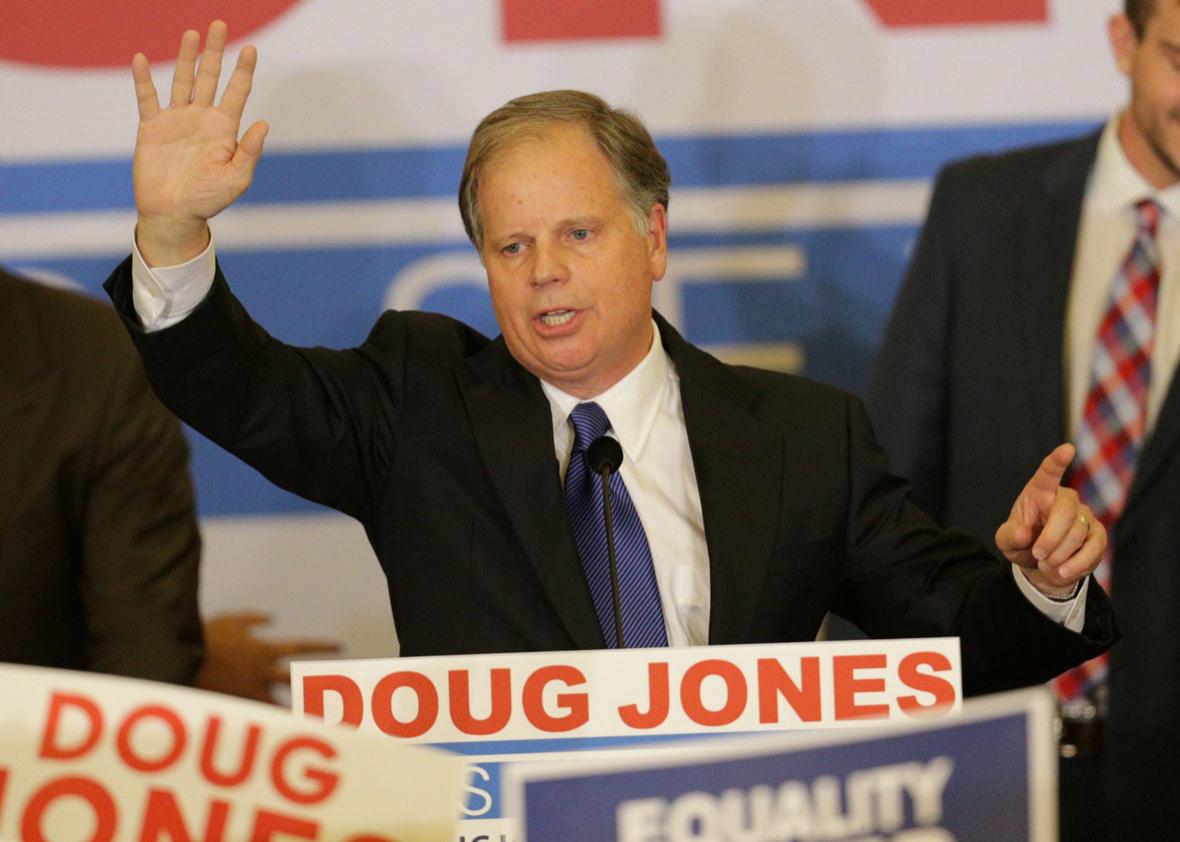Doug Jones’ victory over Roy Moore on Tuesday night elated Democrats across the country, and not just those Democrats passionately opposed to the election of child predators. With what will only be a two-vote margin in the upper chamber after Jones is seated, Republicans will have a much more difficult job passing their agenda next year. Moreover, with prime pickup opportunities in Nevada and Arizona, Democrats’ odds of recapturing the Senate are suddenly pretty good. There’s also a potentially bigger development here, and one that might sound a little crazy: Doug Jones should consider running for president.
At first glance, the idea of Doug Jones seeking the Democratic nomination in 2020 is absurd. This was his first serious political race; he has no national experience; he was almost completely unknown six months ago; the election he won was extremely unique. But during a time in which career politicians are lucky to be merely disliked, Jones’ biography has much to offer. A former United States attorney appointed by President Bill Clinton, Jones prosecuted several high-profile cases, including the anti-abortion terrorist Eric Rudolph. Even more notably, he led the effort to try two of the (Klans)men behind the infamous 1963 16th Street Baptist Church bombing in Birmingham, Alabama. This background doesn’t necessarily suggest that Jones would be a skilled campaigner and politician, but the race he just ran was extremely impressive. He managed to find the right balance between keeping national Democrats at a distance and using certain surrogates in the closing days of the campaign to motivate the Democratic base; he attacked Moore with gusto and skill in a way that Democrats sometimes have trouble doing when facing their Republican adversaries; and as his election night speech conveyed, he showed himself at ease onstage, nicely balancing toughness and affability.
But his surprising political chops only tell part of the story. It’s worth taking a step back to appreciate the shocking situation Doug Jones finds himself in. Here is a man from an extremely conservative Southern state who has not taken policy positions that will turn off Democratic primary voters. The most persuasive criticism of Jones’ campaign, from the standpoint of cold calculation, was that he didn’t soften his pro-choice message, which is unpopular in Alabama, as even Tuesday night’s exit poll showed. But the fact that he didn’t moderate—and wasn’t forced to engage in great detail on issues such as gay rights and gun control—might mean that he could figure out how to pull off a presidential run aimed at Democratic base voters without having to contort himself or flip-flop.
Of course this was partly a matter of luck: A Democrat would never have won against a generic Republican; Moore didn’t have a big war chest to highlight Jones’ positions; and the focus on Jones’ opponent meant that he never had to really engage with certain sensitive issues. In short, he didn’t have to be Joe Manchin. The pro-gun, pro-life Manchin is very popular in his state of West Virginia but would get destroyed in a Democratic presidential primary. To have an elected official from a deeply red state who has said very little to turn off Democrats in New York and California is a godsend.
While no Democrat, including Jones, is going to perform well in 2020 with rural white voters, Jones might be able to keep those losses at manageable levels, in part simply because he is a white Southern male. (I don’t like typing that any more than most people like reading it.) Even more importantly, he has shown the crucial ability to win strong support from black voters. The size and margin of the black vote on Tuesday was probably due more to Moore’s racism and the Jones campaign’s impressive get-out-the-vote effort (which presumably he deserves some credit for), but Jones’ personal story, which now includes this win against Moore, should still appeal to numerous elements of the Democratic base, including black voters. Strong black support for someone who prosecuted the Klan running against an unreconstructed racist is hardly surprising and would have the chance to repeat itself if Jones were the Democratic nominee taking on Trump.
There are other reasons to think Jones would match up well against Trump specifically, who does not merely share bigoted views with Moore but also runs nasty campaigns and has been credibly accused of sexual misconduct. Jones’ blistering attacks on Moore’s behavior were hugely effective and powerful, and he handled the issue of Moore’s conduct with the seriousness and aggressiveness it deserved. “I damn sure believe and have done my part to ensure that men who hurt little girls,” he said memorably, “should go to jail, not the Senate.” (It’s true that Hillary Clinton was aggressive in her attacks on Trump’s morality, but the same message coming from a former prosecutor whose spouse has not been accused of sexual misconduct and who won’t be called shrill every time he raises his voice may be more effective in our dumpster fire of a society.)
This is all, of course, extremely premature. Jones will need to display political skill and policy substance once he arrives in the Senate, just as Barack Obama—another Democrat who was relatively inexperienced when he landed in Washington—had to do after his election in 2004. But Obama’s astonishingly quick rise—not to mention Trump’s—is a good example of how little traditional experience matters anymore. If Jones can keep himself in the spotlight, and adjust easily to the national stage, there is no reason not to think of him as a contender. Even if a vice presidential nod is the more likely possibility, Jones’ bizarre and unbelievable success this month should at least be enough to get Democrats thinking about his future. Stranger things have happened. In fact, they now happen every day.
